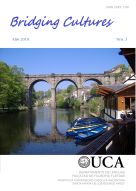Una Vida Imaginaria de David Malouf: una aproximación ecocrítica-poscolonial
Palabras clave:
David Malouf, Literatura australiana, Ecocrítica, Literatura poscolonial, Hibridez, Otredad, Lo no humanoResumen
El presente trabajo propone un análisis de la novela Una Vida Imaginaria del escritor australiano David Malouf desde la doble perspectiva ecocrítica y poscolonial para la cual la obra ofrece un terreno fértil. Se hace énfasis en conceptos fundamentales de ambas teorías como lo humano y lo no humano, cultura y naturaleza, hibridez y otredad, entre otros. A través de esta interpretación se invita a reflexionar sobre universos posibles, la vigencia del discurso literario de Malouf y su adaptabilidad a diversos contextos históricos y culturales.
La novela retoma el exilio del poeta romano Ovidio en Tomis, en el extremo del Imperio Romano. Esta comunidad semisedentaria era invadida periódicamente por los pueblos bárbaros que la circundaban. Poco se sabe sobre la vida del poeta durante su exilio en esta aldea, de donde nunca regresó, y es este vacío el que Malouf aprovecha para enmarcar su relato. La experiencia del exilio, la inserción del personaje en este nuevo mundo alejado de la civilización, el encuentro del protagonista con un niño salvaje, la relación que establecen y la transformación que sufre Ovidio, entre otros aspectos, hacen de la novela un texto apto para una lectura poscolonial y ecocrítica. Si bien no transcurre en Australia, es un autor australiano el que se atreve a presentar el personaje histórico no en el centro como en sus días de gloria, sino en la periferia. Australia también puede ser entendida como la periferia e Inglaterra, la nación que la colonizó, como el centro. Malouf en su relato ficcional nos presenta los conflictos interiores que surgen en la periferia, reivindica ese lugar y lo resignifica.
Descargas
Descargas
Publicado
Cómo citar
Número
Sección
Licencia








